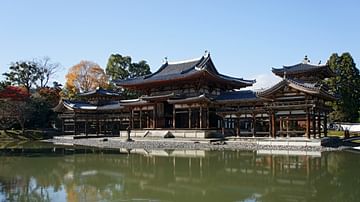Search
Search Results

Definition
Roman Constitution
Roman constitution was an accumulation of laws, legal decisions, and ancient customs. While today 'constitution' usually refers to a single act of legislation, this was not the case in ancient Rome. Instead, Roman government relied on the...

Definition
Byzantine Emperor
The Byzantine Emperor ruled as an absolute monarch in an institution which lasted from the 4th to 15th century CE. Aided by ministers, high-ranking nobility, and key church figures, the emperor (and sometimes empress) was commander-in-chief...

Definition
Confucianism
Confucianism is a philosophy developed in 6th-century BCE China, which is considered by some a secular-humanist belief system, by some a religion, and by others a social code. The broad range of subjects touched on by Confucianism lends itself...

Definition
Qin Dynasty
The Qin Dynasty (221-206 BCE) was the first dynasty of Imperial China (defined as the era of centralized, dynastic government in China between 221 BCE and 1912 CE) which united the separate states following the Warring States Period (c. 481-221...

Article
The Home Fronts in World War I - The Effects of Total War on Civilians
The First World War (1914-18) saw fighting on an unprecedented scale but also involved civilians as never before. For the first time, people hundreds of miles from the fighting front were vulnerable to air attacks. The war at sea dramatically...

Article
Women in the Russian Revolution
Women actively participated in the Russian Revolution of 1905 and the two revolutions of 1917, which deposed the tsar and established a Bolshevik government. Women worked both within the Bolsheviks led by Vladimir Lenin (1870-1924) and in...

Article
The Evacuation of Children in Wartime Britain
The evacuation of children from British cities during the Second World War (1939-45) was the largest population movement the country has ever experienced. Some 6 million women and children voluntarily evacuated from large cities to live with...

Article
The Role of Workers' Soviets in the Russian Revolutions
Soviets, often called Soviets of Workers' Deputies, were worker councils first formed during the Russian Revolution of 1905 when a general strike was called against the Tsarist regime. Factory and other types of workers across the newly industrialised...

Definition
American Revolution
The American Revolution (1765-1789) was a period of political upheaval in the Thirteen Colonies of British North America. Initially a protest over parliamentary taxes, it blossomed into a rebellion and led, ultimately, to the birth of the...

Definition
Heian Period
The Heian Period of Japanese history covers 794 to 1185 CE and saw a great flourishing in Japanese culture from literature to paintings. Government and its administration came to be dominated by the Fujiwara clan who eventually were challenged...